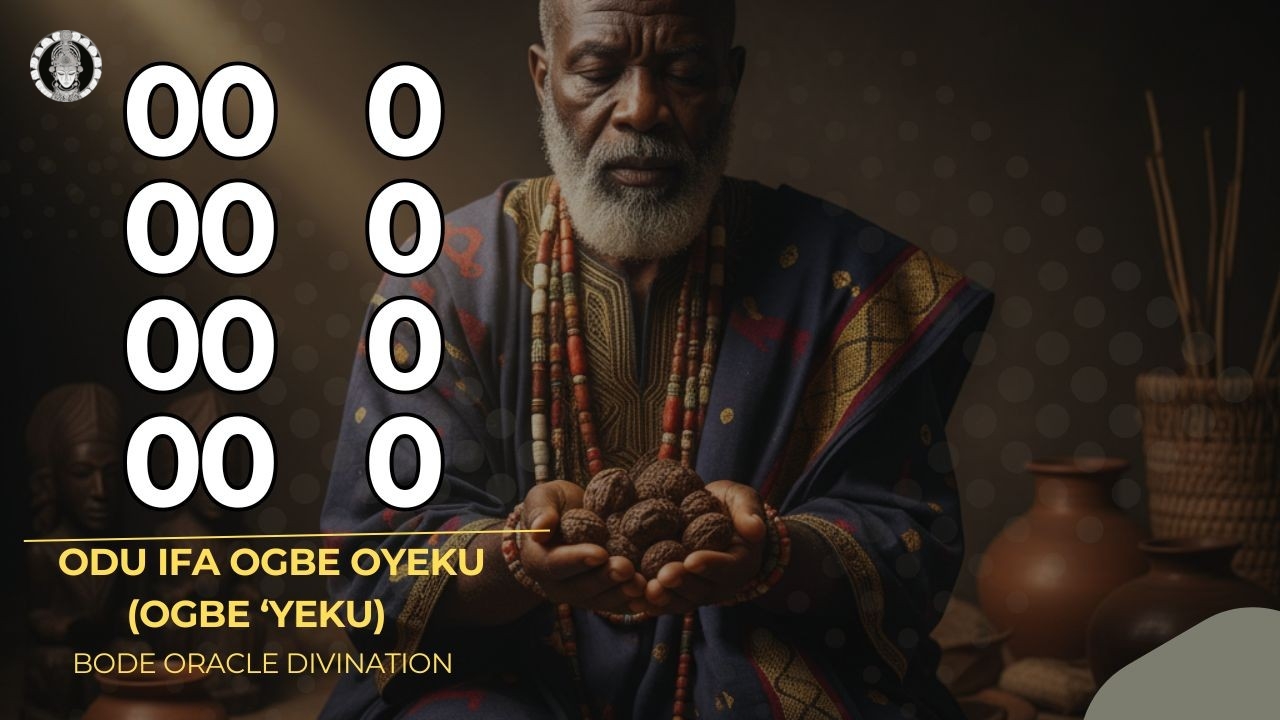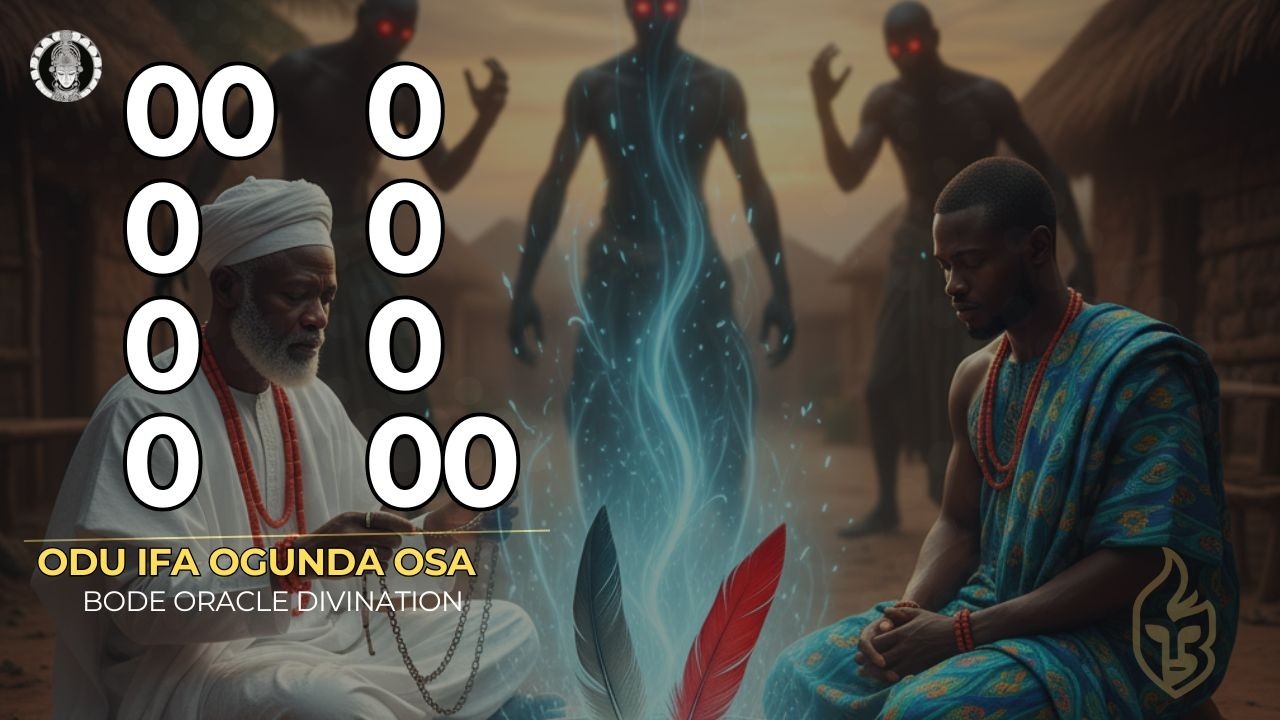Introduction to Odu Ifa Ogunda Osa (Ogunda Masa)
Odu Ifa Ogunda Osa, also known as Ogunda Masa, represents one of the 256 sacred divination signs in the Ifa corpus. This profound Odu carries essential messages about the transformative power of spiritual knowledge, the supremacy of sacrifice over physical medicine, the importance of divine timing, and strategic victory over enemies. Through the wisdom of Ogunda Osa, we learn that dedication to Ifa study combined with faithful sacrifice creates the pathway to comprehensive prosperity.
The divinations within Ogunda Osa address fundamental spiritual principles: how knowledge of Ifa itself becomes the source of blessings, why spiritual solutions surpass material remedies, the power of early morning devotion, and how to defeat multiple adversaries through specific spiritual preparations. Each story serves as both practical instruction and philosophical teaching, guiding devotees toward a life where spiritual discipline produces tangible results. For comprehensive understanding of the Ifa divination system and its global recognition, explore scholarly resources on this ancient wisdom tradition.
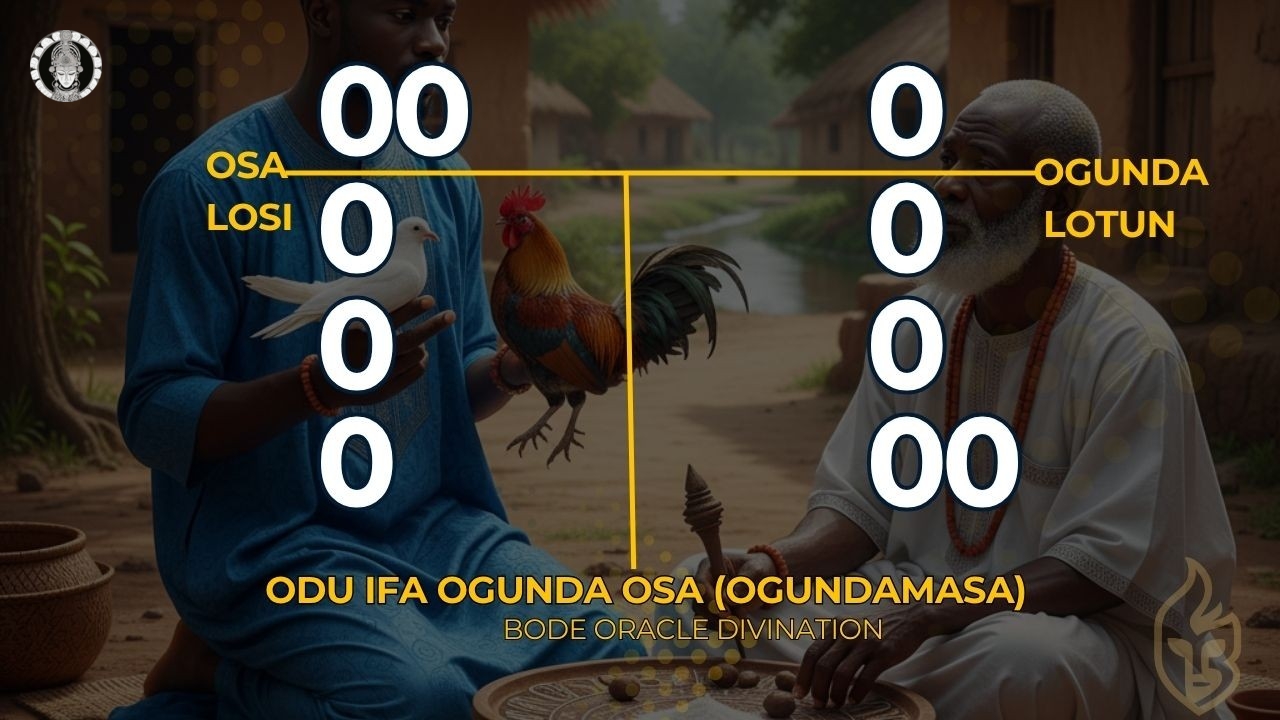
Ifa Divination for The Oracle: Knowledge as the Foundation of Prosperity
The Sacred Pursuit of Ifa Wisdom
This divination from Ogunda Osa addresses someone who earnestly desires to learn Ifa—not out of casual curiosity, but from genuine spiritual hunger. The person comes from royal lineage, being the son of the king of Akure, yet recognizes that inherited position alone cannot provide the blessings of goodness they seek. This teaches a profound truth: spiritual knowledge transcends social status, and even those born to privilege must pursue wisdom through proper channels.
The plea "Please, teach me" (E komi) carries deep humility. Despite royal heritage, the seeker approaches Ifa as a student, acknowledging their need for instruction. This humility becomes the doorway through which knowledge enters, and through knowledge, all blessings flow. Ifa's response affirms that learning its wisdom directly connects the student to prosperity and wealth.
The Sacred Verse
Koko inu ewure ni koni eni san san loni abata
Adifafun ifa ni mofeko
Tii se omo oba lode akure
Igba tin momi oju sogbere ire
Ebo won ni ose
O si gbebo nibe orubo
Nje ifa ni mo fe ko
E komi
Ti mo ba ko fa
Maa la maa di olowo
English Translation
Koko inu ewure ni koni eni san san loni abata
Ifa divination was cast for "Ifa is what I want to learn,"
Who was the son of the king of the city of Akure.
When he was crying for the blessings of goodness,
He was asked to offer a sacrifice,
And he complied.
Therefore, I want to know more about Ifa.
Please, teach me.
If I learn about Ifa,
I will be greatly blessed and wealthy.
Crying for Blessings: The Spiritual Significance of Tears
The phrase "when he was crying for the blessings of goodness" (igba tin momi oju sogbere ire) reveals spiritual depth. These tears are not weakness but expression of genuine spiritual yearning. In Yoruba cosmology, sincere emotional appeal moves spiritual forces to respond. The tears demonstrate that the seeker values spiritual knowledge above comfort, recognizing it as essential rather than optional.
This emotional authenticity, combined with willingness to perform prescribed sacrifice, creates the spiritual opening through which Ifa's wisdom flows. The teaching is clear: casual interest in Ifa yields casual results, but passionate pursuit combined with proper sacrifice brings transformation.
Knowledge as Direct Path to Wealth
The promise "If I learn about Ifa, I will be greatly blessed and wealthy" (Ti mo ba ko fa, Maa la maa di olowo) establishes a direct causal relationship between Ifa knowledge and prosperity. This is not metaphorical but literal—learning Ifa's wisdom reorganizes one's relationship with spiritual forces, opening channels through which blessings flow naturally. The wealth referenced includes material prosperity but extends to spiritual richness, wisdom, peace, and all forms of goodness.
Prescribed Offerings (Ebo)
For those seeking to learn Ifa and receive blessings through knowledge, the prescribed offerings include a rooster (akuko), representing authority and announcement of one's spiritual commitment; pigeons (eyele), symbolizing peace and the gentle reception of wisdom; and money (opolopo owo), which facilitates the practical aspects of learning and demonstrates serious investment in spiritual education. For deeper insight into Ifa as a UNESCO-recognized cultural heritage, explore its global significance.
Practical Application for Modern Seekers
In contemporary times, this divination speaks to anyone pursuing spiritual knowledge seriously. Whether studying under a Babalawo, learning through texts, or seeking to deepen Ifa understanding, the principle remains: approach with humility, offer proper sacrifice, and trust that knowledge itself becomes the vehicle for comprehensive blessings. The Odu warns against superficial engagement while promising that sincere dedication yields prosperity in all areas of life.
Ifa Divination for The Elderly Man: The Supremacy of Sacrifice Over Medicine
The Power of Spiritual Solutions
This divination from Ogunda Osa contains one of Ifa's most radical teachings: never trust in medicine, but rely entirely on sacrifice. An elderly man traveling to Atare Akala receives divination revealing that all his blessings—wealth, marriage, children, and comprehensive prosperity—will come not through any special medicine or physical intervention, but purely through faithful performance of sacrificial offerings.
The repetitive structure of this verse is pedagogically intentional. By stating four times that blessings came "as if using very strong medicine, but having no special medicine—only sacrificial offerings," Ifa drives home its central message: spiritual solutions produce results that appear miraculous to those who rely on material means alone.
The Sacred Verse
Oso kuju kuju bi kagbejo o ya nu ha ha
Bi enipeyo beniko le bu nije
Adifafun baba arugbo
Ti n lo soko atare akala
Ebo won ni o se
O si gbebo nibe o rubo
Nje babarugbo laje kan loni
Adabi eni to loogun tin sa
Baba arugbo ologun ebo loni
Baba arugbo laya kan loni
O dabi eni tologun tin sa
Baba arugbo ologun ebo loni
Baba arugbo bimo kan loni
Odabi eni tologun ti n sa
Baba arugbo ologun ebo lo ni
Babaarugbo ni ire gogbo kan loni o da bieni tolo gun tinsa
Baba rugbo ologun ebo lo ni.
English Translation
Oso kuju kuju bi kagbejo o ya nu ha ha
As if killing someone.
Ifa divination was cast for an elderly man of advanced age
Who was going to the city of Atare Akala.
He was asked to offer a sacrifice,
And he complied.
Therefore, the elderly man received the blessing of wealth today,
As if he were using very strong medicine,
But he has no special medicine—
It is only the sacrificial offering to which he committed.
The old man receives the blessing of a new wife,
As if he were using very strong medicine,
But he has no special medicine—
It is only the sacrificial offering to which he committed.
The old man receives the blessing of giving birth today,
As if he were using very strong medicine,
But he has no special medicine—
It is only the sacrificial offering to which he committed.
The old man receives the blessing of all goodness,
As if he were using very strong medicine,
But he has no special medicine—
It is only the sacrificial offering to which he committed.
The Irony of Appearing Powerful
The phrase "as if he were using very strong medicine" (Adabi eni to loogun tin sa) creates deliberate irony. To external observers, the dramatic transformation in the elderly man's life appears to be the result of powerful medicine (ogun). In Yoruba culture, ogun refers to potent herbal or spiritual preparations that produce specific effects. However, Ifa repeatedly clarifies that no such medicine was involved—only sacrifice (ebo).
This ironic comparison serves multiple purposes: it acknowledges that results are indeed dramatic and tangible, it addresses the common human tendency to attribute spiritual results to material causes, and it establishes the supremacy of ebo over all other forms of intervention. The teaching is that sacrifice, properly performed, produces effects more powerful than any medicine.
Four Categories of Comprehensive Blessing
The divination specifies four areas where blessing manifests: wealth (aje), representing financial prosperity and material abundance; a new wife (aya), symbolizing companionship, renewal of relationship, and domestic blessing; children (omo), indicating fertility, legacy, and the blessing of seeing one's lineage continue; and all goodness (ire gbogbo), encompassing every form of blessing not already specified. Together, these represent total life transformation.
The fact that an elderly man receives all these blessings demonstrates that it is never too late for spiritual intervention to transform circumstances. Age, past failures, or current limitations do not prevent Ifa's blessings from manifesting when proper sacrifice is performed with faith.
The Critical Warning About Medicine
Ifa's explicit instruction that one must "never trust in medicine but always rely on sacrifice" addresses a dangerous tendency: seeking spiritual solutions only after physical remedies fail. The Odu teaches that spiritual problems require spiritual solutions primarily, not secondarily. This does not forbid the use of medicine entirely but establishes proper hierarchy—spiritual intervention comes first, and other remedies, if used, should complement rather than replace it.
The Significance of Alligator Pepper
The requirement to include abundant alligator pepper (opolopo atare) in sacrificial offerings is spiritually significant. Atare is among the most sacred substances in Yoruba spirituality, used in virtually every important ritual. In Ogunda Osa, abundant use of alligator pepper serves multiple functions: it awakens spiritual forces to receive the offering, it demonstrates proper respect and seriousness, it amplifies the potency of other sacrificial items, and it creates spiritual clarity that allows blessings to manifest without obstruction. Learn more about mathematical and symbolic patterns in Ifa divination from scholarly research.
Prescribed Offerings (Ebo)
For receiving comprehensive blessings and demonstrating faith in sacrifice over medicine, Ifa prescribes a rooster (akuko adie), representing the authority to command blessings and announce one's transformation; abundant alligator pepper (opolopo atare), which activates spiritual forces and demonstrates proper reverence; a pigeon (eyele), symbolizing peace and the gentle reception of multiple blessings; and money (opolopo owo), facilitating the practical aspects of transformation and enabling the completion of sacrificial requirements.
Modern Application: Spiritual Solutions First
For contemporary practitioners, this divination challenges the modern tendency to exhaust material solutions before considering spiritual intervention. Whether facing health challenges, relationship difficulties, financial struggles, or other life problems, Ogunda Osa teaches that spiritual solutions should be primary, not last resort. This doesn't mean abandoning practical actions, but rather ensuring spiritual foundations are properly established before or alongside material efforts.
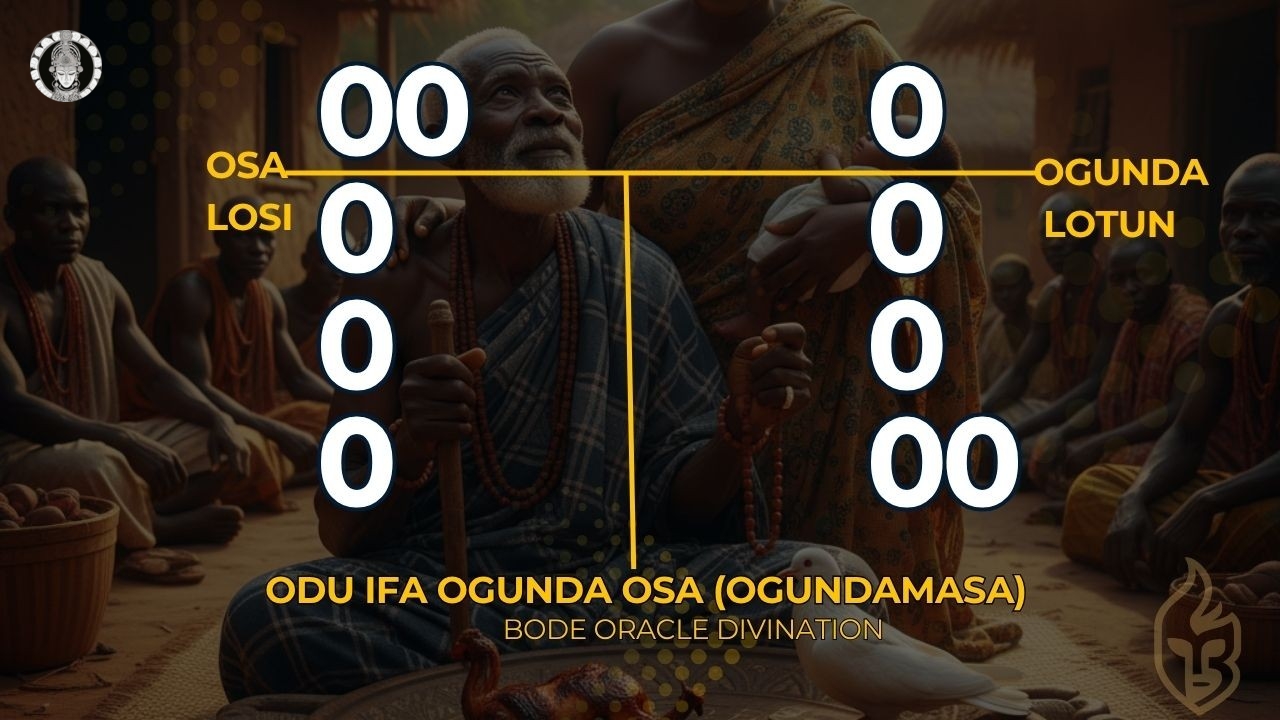
Ifa Divination for Orunmila: Divine Timing and Early Morning Devotion
The Power of Pre-Dawn Spiritual Practice
This divination from Ogunda Osa reveals Orunmila preparing to ascend to heaven while leaving his treasurer (akapore) on earth. The imagery is profound—Orunmila, the witness of destiny, must return to the spiritual realm, but his treasures and blessings remain accessible to devotees on earth. The condition for accessing these blessings is consistent early morning devotion before daybreak.
The repeated invocation "Ajugbuduru ope, do not forget to bring" creates a rhythmic prayer that demonstrates both trust and reminder. Orunmila acknowledges that blessings are coming but have not yet arrived. Rather than expressing doubt or anxiety, he maintains faithful expectation, knowing that what Ifa has promised will manifest at the appointed time.
The Sacred Verse
Ajugbuduru
Adifafun orunmila
Baba o fi akapore sile aye
Yoo gbode orun lo
Ebo won ni o se
O si gbebo nibe o rubo
Nje ajuguduru mo gbagbe o mun bo
Ire aje ti mo wi kede
Ifa ajugbuduru ope mo gbagbe omun bo
Ire aya ti mo wi e de
Ifa ajugbuduru ope mo gbagbe o mun bo
Ire omo ti mo wi ee de
Ifa ajugbudure ope mo gbagbe o mun bo
Ire gbogbo ti mo wi kee de
Ifa ajugbuduru ope mo gbagbe o munbo
English Translation
Ajugbuduru
Ifa divination was cast for Orunmila,
Who will leave his treasurer on earth
And ascend to heaven.
He was asked to offer a sacrifice,
And he complied.
Therefore, Ajugbuduru Ope, do not forget to bring with you
The blessing of wealth that I said is yet to come.
Ifa Ajugbuduru Ope, do not forget to bring with you
The blessing of a new wife that I said has not yet arrived.
Ifa Ajugbuduru Ope, do not forget to bring with you
The blessing of giving birth that I said is yet to come.
Ifa Ajugbudure Ope, do not forget to bring with you
The blessing of all goodness that I said is yet to come.
Ifa Ajugbuduru Ope, do not forget to bring with you.
Understanding "Ajugbuduru Ope"
The phrase "Ajugbuduru Ope" is both a name and an invocation. "Ajugbuduru" suggests something vast, encompassing, or all-inclusive, while "Ope" means "thank you" or acknowledgment. Together, they create an acknowledgment of the comprehensive nature of blessings that are coming. This is not begging but rather confident reminder—the devotee thanks Ifa in advance for what has been promised, demonstrating faith that it will manifest.
The Treasurer Left on Earth
The symbolism of Orunmila leaving his treasurer (akapore) on earth while ascending to heaven is rich with meaning. The treasurer represents the accessible source of blessings that remains available to devotees even when direct connection to Orunmila seems distant. This treasurer is accessed through consistent spiritual practice, particularly early morning devotion, which creates the channel through which heavenly blessings flow to earthly recipients.
This imagery teaches that spiritual blessings are not random or arbitrary—they flow through established channels maintained by disciplined practice. The devotee who faithfully honors Ifa before daybreak positions themselves to receive what has been set aside for them in the heavenly treasury.
Blessings That Are "Yet to Come"
The phrase "ti mo wi kede" (that I said is yet to come) appears repeatedly, emphasizing an important spiritual reality: promised blessings exist in the spiritual realm before manifesting physically. They are not non-existent but are in transit. This understanding prevents despair during waiting periods. The blessing of wealth exists, the blessing of marriage exists, the blessing of children exists, the blessing of all goodness exists—they are simply not yet visible in physical reality.
This teaching addresses the gap between promise and manifestation, which tests faith more severely than outright denial. Ogunda Osa instructs devotees to maintain spiritual practice during this gap, trusting that what has been promised is indeed coming.
The Discipline of Pre-Dawn Worship
Ifa's specific instruction to wake early and render homage before daybreak is not arbitrary. The pre-dawn hours carry special spiritual potency—the boundary between night and day represents a liminal space where spiritual and physical realms interact more fluidly. Those who honor Ifa during these hours demonstrate serious commitment, as this requires sacrifice of comfort and convenience. Explore the UNESCO documentation on Ifa of the Yoruba people for deeper cultural context.
Morning devotion also establishes spiritual priority—by honoring Ifa before engaging worldly activities, the devotee acknowledges that spiritual alignment is the foundation upon which successful days are built. This practice creates consistency that spiritual forces recognize and reward.
Prescribed Offerings (Ebo)
For receiving promised blessings and maintaining spiritual connection despite physical distance from the source, Ifa prescribes a rooster (akuko adie), whose morning crow symbolizes the awakening required for pre-dawn devotion; a pigeon (eyele), representing peaceful reception of blessings that are in transit; and money (opolopo owo), facilitating the manifestation of promised prosperity and enabling completion of spiritual obligations.
Practical Application: Patience with Practice
Modern practitioners receiving this divination should establish or strengthen early morning spiritual practice, maintain faith during waiting periods between promise and manifestation, acknowledge blessings as "coming" rather than "absent," and combine patience with consistent spiritual discipline. The Odu teaches that divine timing is perfect—blessings arrive neither too early (causing instability) nor too late (causing despair), but exactly when spiritual preparation is complete.
Ifa Divination for Orunmila: Victory Over Multiple Enemies
Confronting Organized Opposition
This final divination from Ogunda Osa addresses a serious situation: the person receiving this Odu faces numerous enemies who are organized against them. Unlike casual opposition or isolated adversaries, these enemies are coordinated (awon ota po), making them more dangerous. Ifa's prescription is specific and strategic—victory requires particular spiritual weapons that bind, trap, and neutralize enemy activity.
What distinguishes this divination is its precision. Generic sacrifices are insufficient when facing organized opposition. Instead, Ifa prescribes exact materials that create spiritual traps (fa), ensuring enemies become ensnared in their own schemes while the devotee remains protected.
The Sacred Verse
Morarinimorapoongba
Asosa kosun eye oko
Aje kelana omo kulale
Adifafun orunmila won nigbe
Ibi kan baba la tari
Ebo won ni o se
O si gbebo nibe o rubo
Nje kin ni o gbe ibi kuro lori awo
Agbe ni o gbe ibi kuro lori awo
Kin ni oye ibi ori awo danun
Iye niyebi ori awo dani
Egan rere gori awo
Ori awo akasigba
Emi o le rasingba
Ki n wa wi egan rere gori awo
Ori awo akasigba
English Translation
Morarinimorapoongba
Asosa kosun eye oko
Aje kelana omo kulale
Ifa divination was cast for Orunmila
When enemies were troubling him greatly.
He was asked to offer a sacrifice,
And he complied.
Therefore, what removed evil from the Babalawo?
It was the blue turaco bird that removed evil from the Babalawo.
What made evil turn sweet upon the Babalawo?
It was the feathers that made evil turn sweet upon the Babalawo.
Good fortune rests upon the Babalawo.
The Babalawo's head cannot be bought.
I cannot purchase it,
So I speak good fortune upon the Babalawo.
The Babalawo's head cannot be bought.
The Blue Turaco: Spiritual Weapon Against Evil
The agbe (blue turaco) is a bird of particular spiritual significance in Yoruba cosmology. Its distinctive blue-green plumage and unique call make it recognizable and spiritually potent. In this divination, the agbe serves as the primary agent removing evil (ibi) from the Babalawo. The bird's feathers, when properly prepared as prescribed by Ifa, create a spiritual sweeping that clears negative forces away from the devotee.
The turaco's association with forests and hidden places makes it effective against enemies who operate in concealment. Just as the bird moves through dense vegetation unseen, its spiritual essence penetrates hidden schemes and exposes enemy activity, rendering it ineffective.
Making Evil "Turn Sweet"
The phrase "what made evil turn sweet upon the Babalawo" (Kin ni oye ibi ori awo danun) contains profound spiritual wisdom. The goal is not merely to deflect evil but to transform it—making what was intended as harm become blessing instead. The feathers (iye) accomplish this alchemical transformation when used properly in sacrifice.
This teaches that proper spiritual preparation can reverse enemy intentions completely. Plots meant to destroy instead become sources of elevation. Schemes designed to impoverish instead produce prosperity. This transformation is more powerful than simple protection because it uses enemy energy against them while benefiting the devotee.
The Unbuyable Head
The statement "The Babalawo's head cannot be bought" (Ori awo akasigba, Emi o le rasingba) declares spiritual immunity purchased through proper sacrifice. In Yoruba spirituality, the head (ori) represents destiny, consciousness, and the seat of one's spiritual authority. When properly fortified through sacrifice, this ori becomes impervious to spiritual attacks, bribery of one's destiny, or manipulation by enemies.
Enemies may attempt to "buy" or manipulate the Babalawo's destiny through spiritual means, but correct sacrificial preparation makes this impossible. The devotee's destiny remains under their own authority and Ifa's guidance, unable to be purchased, controlled, or redirected by adversaries.
The Specific Prescription: Rope and Feathers
Ifa prescribes ikode (rope or cord), iye agbe (feathers of the blue turaco), and iye aluko (feathers of another specific bird) to be combined and used to make traps (fa). The rope binds enemy activity, preventing movement and action. The turaco feathers sweep away evil and transform harmful intentions. The aluko feathers provide additional spiritual protection and ensure complete coverage.
These items must be prepared by a knowledgeable Babalawo who understands how to combine them properly, invoke necessary prayers, and deploy them effectively. The spiritual power comes not from the physical materials alone but from their proper combination with invocations and strategic placement.
Prescribed Offerings (Ebo)
For victory over organized enemies and protection from coordinated opposition, Ifa prescribes rope or cord (ikode), representing the binding of enemy activity; feathers from the blue turaco bird (iye agbe), which remove evil and transform harmful intentions; feathers from the aluko bird (iye aluko), providing comprehensive spiritual protection; and money (opolopo owo), facilitating the completion of protective work and maintaining spiritual defenses.
Modern Application: Strategic Spiritual Defense
Contemporary practitioners facing opposition at work, in business, within families, or from known or unknown sources should take this divination seriously. The prescription is not generic but targeted—specific spiritual weapons defeat specific spiritual attacks. Consulting a qualified Babalawo ensures proper preparation and deployment of these protective measures. For scholarly analysis of Ifa divination as an artistic expression of Yoruba knowledge, explore academic research on this wisdom system.
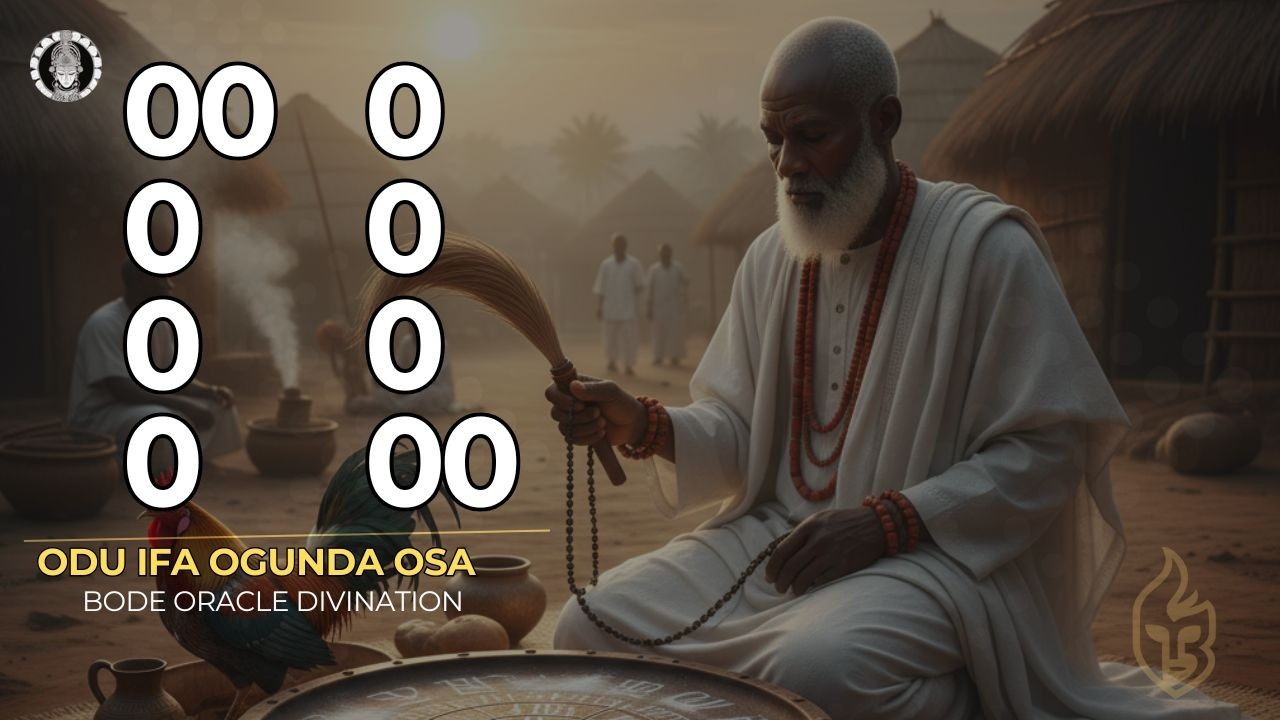
Additional Resources
Internal Links
- Complete Guide to Ogunda Osa - Detailed information, taboos, and practices
- Ogunda Masa (Ogunda Osa) Blog Post
- Bode.ng Blog - Extensive collection of Ifa and Yoruba spirituality articles
- Complete Odu Ifa Directory
- Bode Oracle - Divination Services and Community
External Resources
- African Traditional Religions: Ifa Divination - Duquesne University
- Ifa Divination System - Wikipedia
- Ifa of the Yoruba People of Nigeria - UNESCO Archives
- Ifa Divination System: An Artistic Expression of Yoruba Knowledge Creation
- UNESCO Recognition of Ifa Divination System
- Algebraic Characterization of Ifa Main Divination Codes - ScienceDirect
Connect With Us on Social Media
- BODE Oracle on TikTok
- BODE Oracle on YouTube
- BODE Oracle on Facebook
- BODE Oracle on X (Twitter)
- BODE Oracle on Pinterest
Visit Bode.ng to explore more divination teachings, participate in quizzes and polls, and connect with our community of practitioners and learners. Register today to access exclusive content and personalized guidance on your spiritual journey.
Frequently Asked Questions And Answers About Odu Ifa Ogunda Osa (Ogunda Masa)
Find answers to common questions about this sacred Odu Ifa and its divination teachings
Ogunda Osa, also called Ogunda Masa, is one of the 256 sacred Odu (divination signs) in the Ifa corpus. It carries powerful messages about the acquisition of spiritual knowledge, receiving blessings through proper sacrifice, the importance of early morning spiritual practices, and trusting divine timing over physical medicines. This Odu teaches that through dedication to learning Ifa wisdom and performing prescribed sacrifices, one receives comprehensive blessings of wealth, marriage, children, and all forms of prosperity.
The first divination in Ogunda Osa, for the Oracle who wished to learn Ifa, demonstrates that spiritual knowledge is the foundation of all blessings. Ifa promises that through learning its wisdom, one becomes blessed and wealthy. The Odu emphasizes that knowledge of Ifa is not merely academic but transformative—it directly connects the student to the source of all goodness and prosperity. Those who commit to learning Ifa's teachings receive blessings through the knowledge itself.
The divination for the elderly man in Ogunda Osa teaches a critical lesson: never trust in medicine alone, but always rely on sacrifice. The story reveals that the elder received every blessing—wealth, wife, children, and prosperity—not through any special medicine, but through faithful compliance with sacrificial prescriptions. This teaches that spiritual solutions through Ebo are more powerful than physical remedies. The Odu warns against depending on material solutions when spiritual intervention is what truly brings transformation.
Ogunda Osa specifically instructs that alligator pepper (atare) must be included in sacrificial offerings. Alligator pepper is one of the most sacred substances in Yoruba spirituality, representing spiritual power, clarity, awakening, and divine authority. In this Odu, atare serves as a catalyst that activates the spiritual potency of the sacrifice, ensuring that offerings are received favorably by spiritual forces. The abundant use of atare in Ogunda Osa sacrifices amplifies their effectiveness and demonstrates proper reverence.
The third divination for Orunmila emphasizes that one must always wake up early and render homage to Ifa before daybreak. This practice of early morning devotion positions the devotee to receive blessings that are 'coming' but have not yet arrived. The early morning hours are spiritually potent—when one honors Ifa at this time, they align themselves with divine timing and open channels for blessings to manifest. This discipline demonstrates commitment and creates spiritual receptivity for the day ahead.
Orunmila's prayer in Ogunda Osa repeatedly invokes 'Ajugbuduru ope, do not forget to bring' various blessings that are on their way. This teaches profound patience and trust in divine timing. The blessings of wealth, marriage, children, and prosperity are not absent—they are coming. The devotee's role is to maintain spiritual practice, offer prescribed sacrifices, and trust that what Ifa has promised will manifest at the appointed time. This prevents anxiety while encouraging consistent spiritual discipline.
This phrase appears repeatedly in the elderly man's divination to describe how powerfully blessings manifest—as if strong medicine was used. However, the verse immediately clarifies that no special medicine was involved; only sacrificial offerings were performed. This ironic comparison highlights that proper sacrifice produces results more dramatic and effective than any physical medicine. It teaches that spiritual solutions yield results that appear miraculous to those who rely only on material means.
The final divination warns that enemies are abundant for the person receiving this Odu. Victory over these adversaries requires specific sacrificial items: a cord or rope (ikode), the feathers of a blue turaco bird (agbe), and feathers from another specific bird (aluko). These items are combined to create spiritual traps (fa) that ensnare enemies. The prescription demonstrates that spiritual warfare requires specific spiritual weapons—generic offerings are insufficient when facing organized opposition.
The blue turaco (agbe) is spiritually significant in Yoruba cosmology as a bird associated with removing evil and clearing obstacles. Its feathers in Ogunda Osa sacrifices serve to sweep away negative forces and trap enemies in their own schemes. The bird's distinctive coloring and cry make it spiritually potent for protection work. When combined with rope (ikode), the feathers create a spiritual binding that prevents enemies from causing harm while simultaneously removing their influence from the devotee's path.
Ogunda Osa provides clear behavioral guidance: commit seriously to learning Ifa wisdom rather than approaching it casually, never depend on medicine alone but prioritize spiritual sacrifice, maintain early morning spiritual practice consistently, include alligator pepper in sacrificial offerings, trust divine timing rather than becoming anxious about delayed blessings, and address enemy activity with specific spiritual prescriptions. The Odu emphasizes that proper conduct combined with proper sacrifice creates the conditions for comprehensive blessings.
All sacrifices in Ogunda Osa should be performed under the guidance of a qualified Babalawo who understands the specific requirements of this Odu. Each divination within Ogunda Osa prescribes different items: roosters and pigeons for learning and knowledge, roosters with abundant alligator pepper for comprehensive blessings, and specific bird feathers with rope for enemy defeat. The priest ensures proper invocations accompany each offering, as the spiritual power comes from combining correct materials with correct prayers and timing.
You can explore comprehensive information about Ogunda Irete through several resources:
- Complete Guide to Ogunda Irete - Detailed taboos and practices
- Ogunda Irete Blog Post
- Bode.ng Blog - Extensive articles on Ifa spirituality
- Complete Odu Ifa Directory
- Bode.ng - Access divination services and community resources
Connect with us on social media for regular teachings: TikTok, YouTube, Facebook, X (Twitter), and Pinterest @BODEOracle.
